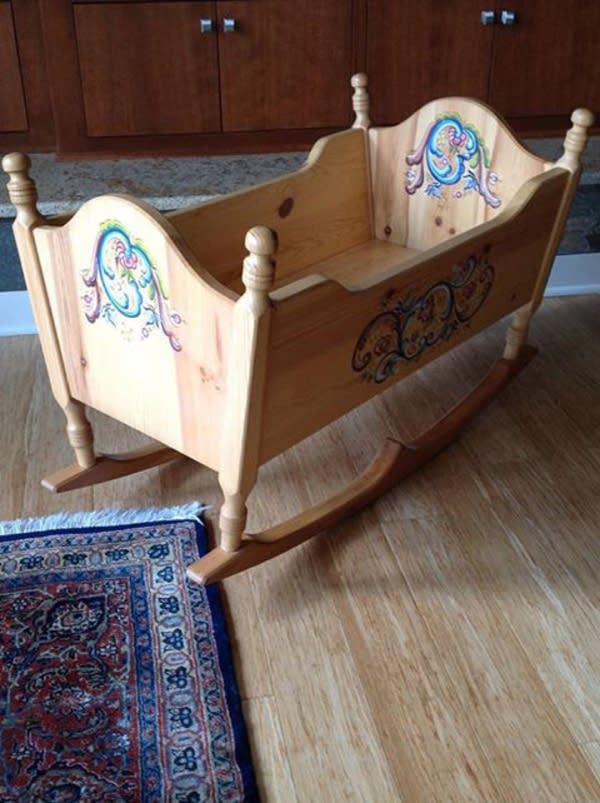Bruce Kramer welcomes a new role in his family

Go Deeper.
Create an account or log in to save stories.
Like this?
Thanks for liking this story! We have added it to a list of your favorite stories.
Editor's note: This is part of our continuing series of stories about Bruce Kramer, the former dean of the College of Education, Leadership and Counseling at the University of St. Thomas, as he copes with life after being diagnosed with ALS, also known as Lou Gehrig's Disease. You can read all the stories in the series by clicking here.
Bruce Kramer has been in two drug trials since his diagnosis. Several weeks ago, his participation in the second trial abruptly ended. He was feeling pretty good while in that trial and had asked the drug company to continue giving him the pills he was taking. So far, there's been no response from the firm.
In the meantime, Kramer is noticing new changes in his health, and welcoming a new role in his family.
He's felt a growing weakness in his neck and has had problems sleeping. Since ALS weakens all the body's muscles, including those that help with breathing, like the diaphragm, Kramer is now thinking of getting something called a diaphragmatic pacing system.
Turn Up Your Support
MPR News helps you turn down the noise and build shared understanding. Turn up your support for this public resource and keep trusted journalism accessible to all.
"It's basically along the same lines as a pacemaker but its for your diaphragm so you get more support under your breathing and you actually are able to breath better with the DPS," he said. The actor Christopher Reeve, who was paralyzed in a horseback riding accident, used such a system and it has been used by other people with spinal cord injuries.
"It has lengthened their lives and also given them a better quality of life because it's allowed them to go off the ventilator, Kramer said.
Before he's fitted for such a device, Kramer has to make several decisions, including finding out whether his insurance will pay for it.
"It's pretty expensive. I'm not going to bankrupt my family for this," he said. "And he's also asking whether there a reasonable expectation that it will increase my quality of life. Other people with ALS have used this system and their sense is there is more strength under their voices -- they don't run out of breath they just feel that they're stronger."
Kramer does feel like he's losing his breath.
"I would invite you to compare this story with the first one and you'll hear the weakening. I just don't have the ability to support my voice the way I used to. When I'm tired, I'm beginning to feel tongue weakness and feeling like there's just a hint of a lisp in my tongue. These things are coming. It is what it is. I know they are coming. I can keep worrying, but frankly I'm more upset that I can't use my hands anymore."
In the midst of these challenges, Kramer has also learned some uplifting news.
"I'm going to be a grandpa! Our son David and his wife Athena are going to have a little girl. We're just, oh, we're thrilled," he said, his voice starting to choke with emotion. "I have started to read books into the computer. I'm going to make mp3's -- discs --of grandpa reading, so when grandpa can't read, the books will still be there."
Bruce wrote an entry in his blog "The Dis-Ease Diary" about the impending arrival of his first grandchild. "One cannot help but marvel at the contrast -- beginning and ending, alpha and omega, birth and death, baby and grandfather yet-to-be."
"I think I am in a distinctly authoritative place to tell you how babies feel. "You eat when somebody gives you food. You wear what they put on you. Every little intimate detail of living I now depend on somebody else for other than breathing. So, that's kind of the life of a baby. Except with a baby, we have this hope they are going to be gaining capability and they're going to be building capacity and with me, I'm shedding capability and shedding capacity and that intersection seems to me to be meet and right. It's just the circle of life. We are born and we die and I'm so thankful that I get to be here to see that completed because, I will tell you, that when I was diagnosed, I really didn't think I would live long enough to see grandkids.
"I don't feel so much like I'm dying as that I'm turning it over. And I like that sense."
---
You can read all the stories in this series by clicking here.





